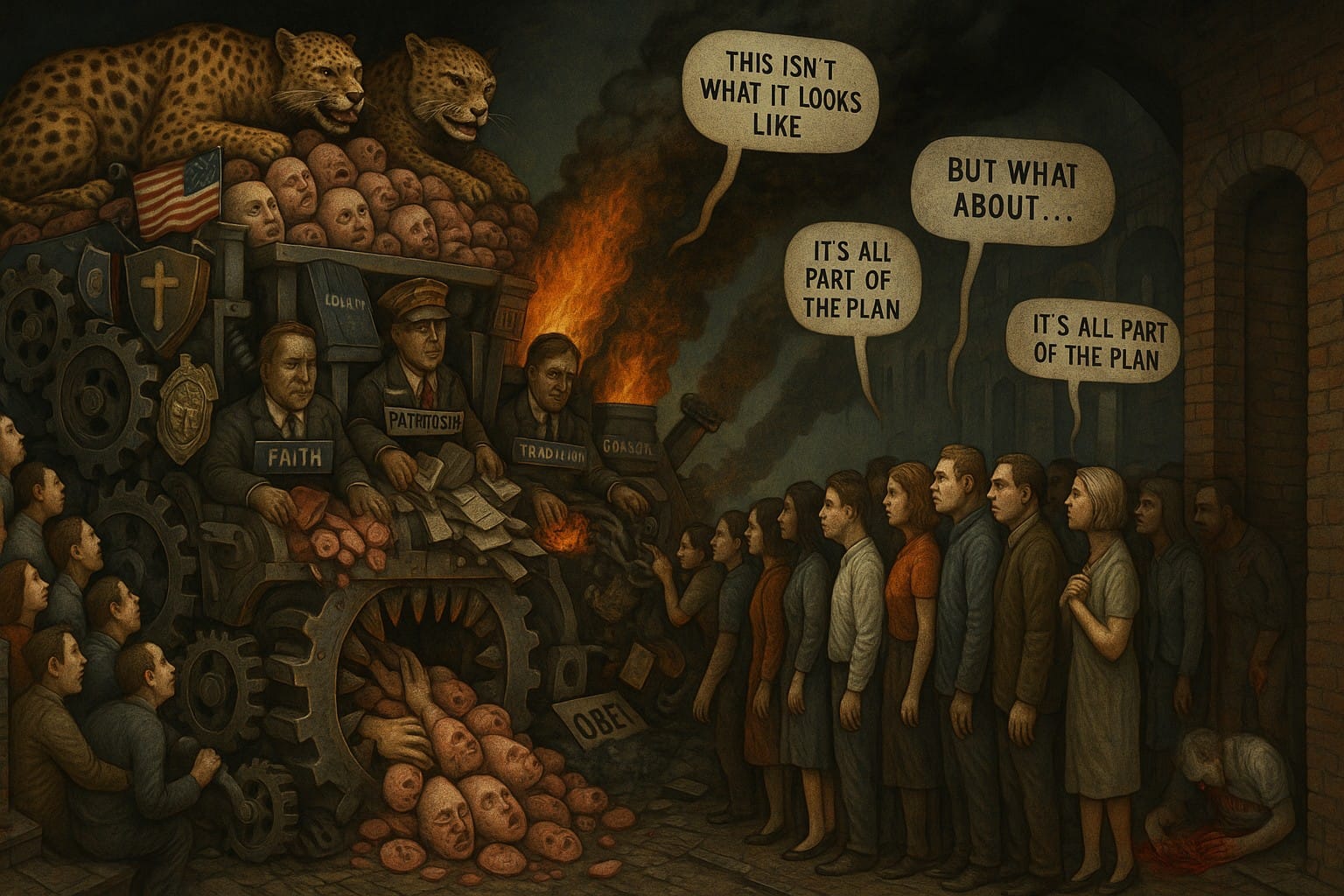
The leopards are getting fat on faces, and still the faithful line up to feed them.
Everywhere you look, people who swore allegiance to institutions, movements, and leaders are watching those very same forces devour everything they claimed to protect. Their response isn't horror—it's creative interpretation. The devotion machine churns on, grinding up evidence, spitting out excuses, somehow convincing millions of otherwise functional humans that their eyes are lying.
This isn't stupidity. It's far more terrifying: the systematic weaponization of human loyalty against human reason.
The Grotesque Theatre of Motivated Reasoning
Watch them perform their daily ritual of reality revision. Documents pile up, testimony mounts, evidence becomes so overwhelming that even sympathetic observers back away—and the true believers adjust their definitions.
"This isn't what it looks like." "You have to understand the context." "Everyone does this." "The timing is suspicious." "But what about..."
Round and round they go, trapped in endless rationalization that makes Sisyphus weep. Except Sisyphus only condemned himself to eternal futility. These people are dragging democracy down with them.
The stunning, horrifying truth: humans will defend anything if you convince them their identity depends on it. Genocide. Torture. Child abuse. Environmental collapse. Nuclear war. The complete dissolution of every moral principle they claim to hold sacred.
Just wrap it in the right flag. Sing the right hymns. Use the right words.
The devotion machine doesn't care what it's grinding up—only that the gears keep turning.
The Sunk Cost Apocalypse
We're witnessing the weaponization of the sunk cost fallacy on a civilizational scale. Millions have invested so much identity, so many social connections, their entire worldview in defending the indefensible, that admitting error would require rebuilding themselves from scratch.
So they won't admit it. They can't.
Instead, they double down. Triple down. Quadruple down until they're standing in smoking ruins of everything they claimed to love, still insisting this was always the plan.
The more monstrous the behaviour, the more creative their justifications. It's watching someone explain why setting their house on fire was a brilliant renovation while standing in ashes holding a gas can.
The truly sick part? The institutions they're defending know this. They're counting on it. They understand that once you've gotten someone to defend one indefensible thing, getting them to defend the next becomes exponentially easier.
It's not a bug in human psychology—it's a feature. And it's being exploited with surgical precision.
The Loyalty Trap
The cruelest joke is this psychological enslavement masquerades as virtue. They call it loyalty. Devotion. Faith. Standing by your people through thick and thin.
But there's a difference between loyalty and complicity, between faith and willful blindness, between standing by someone and helping them bury the bodies.
The devotion machine convinces them that moral standards are just another form of betrayal. That questioning authority is a weakness. That demanding accountability is treason.
So they police themselves. Silence their doubts. Attack anyone who points out that the emperor isn't just naked but actively molesting children in broad daylight.
The guards become prisoners. The prisoners become guards. And somewhere in the middle, truth bleeds out in an alley while everyone argues whether red is really red or maybe more of a patriotic crimson.
The Institutional Immunity Racket
Every powerful institution learns the same lesson: if you make people feel their identity depends on your survival, you can get away with murder.
Churches protect pedophiles. Corporations poison communities. Political movements embrace fascism. Universities cover up sexual assault. Police departments become occupying armies.
And the faithful... adjust. They find new ways to explain why the thing they love is still worth loving, even as it devours everything they claim to care about.
"It's just a few bad apples." "The system is reforming from within." "You can't judge the whole organization by its worst members." "Change takes time."
Meanwhile, the bad apples have taken over the orchard, burned the farmhouse, and are selling poisoned fruit to children while the faithful guard the gates, insisting this is all part of God's plan.
The Moral Event Horizon
There's a point—and we've long passed it—where defending an institution requires becoming something monstrous yourself, where loyalty demands complicity, where faith requires blindness.
The devotion machine has grotesque elegance: it doesn't just protect corrupt institutions from accountability—it corrupts the people protecting them. It turns ordinary humans into active participants in their own moral destruction.
They don't just look away anymore. They actively attack victims. Weaponize trauma. Sacrifice their children, neighbours, souls on the altar of institutional preservation.
And call it righteousness.
The Unraveling
The most terrifying part isn't what the devotion machine does to institutions—it's what it does to the people running it.
Watch any institution long enough: the people at the top start believing their propaganda. They think they're above the law, beyond accountability, chosen by destiny or divinity to rule over us.
The corruption flows both ways. Institution corrupts believers, believers corrupt the institution, until you have a feedback loop of moral decay consuming everything it touches.
And still, the faithful line up to feed the machine. Still insist this time will be different. Still believe their devotion will somehow transform the monster into a saviour.
The leopards are getting fat on faces.
There are always more faces.
The devotion machine runs on human loyalty and produces human suffering. It has no other function. It serves no other purpose. It will continue running until we stop feeding it—or until there's nothing left to feed.
The choice, such as it is, remains ours.
I don't sell memberships or anything, but if you want to buy me a beer, I won't refuse.


